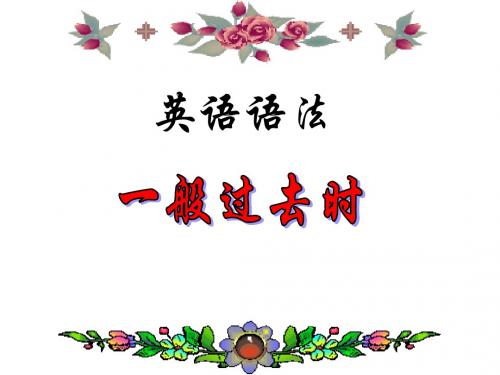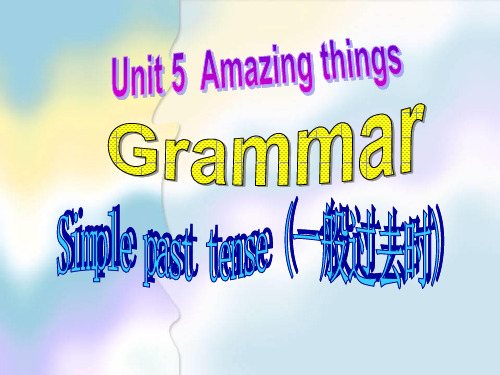PPT讲解(一般过去时)
合集下载
一般过去时学习ppt课件

Lucy __d_id_n_’_t_ ___d_o___ her homework at home. 2、He found some meat in the fridge.(变一般疑问句)
__D_i_d__ he __f_in_d_ ___a_n_y_ meat in the fridge? 3、She stayed there for a week.(对划线部分提问)
2、His father worked all day last Monday.(改一般疑问句) __D_i_d__his father ___w_o_r_k__ all day last Monday?
3、 I was very busy last week. (改否定句和一般疑问句) I __w__as_n_’_t_ very busy last week. _W__er_e_ you very busy last week?
2. 结尾是 e 的动词加 -d
3. 末尾只有一个辅音字母的重读 闭音节词,先双写这个辅音字 母,再加-ed
look play start live hope use
stop plan trip
looked played started lived hoped used
stopped planned tripped
/t/ /d/ 之后念 /id/ , 即 ed 在 /t/ /d/ 音后面念 /id/
例:wanted shouted needed counted
“雪亮工程"是以区(县)、乡(镇) 、村( 社区) 三级综 治中心 为指挥 平台、 以综治 信息化 为支撑 、以网 格化管 理为基 础、以 公共安 全视频 监控联 网应用 为重点 的“群 众性治 安防控 工程” 。
一般过去时.语法讲解PPT

时间状语不同
一般过去时常用的时间状语包括过去的时间点、过去的时间段 等,而过去完成时常用的时间状语包括“已经”、“之前”等
。
05
一般过去时的练习与巩固
填空练习
总结词
填空练习是巩固一般过去时的有效方法,通过在句子中留空,让学生填写正确的动词时态,加深对一般过去时的 理解和运用。
详细描述
在填空练习中,教师可以选择一些包含一般过去时的句子,故意去掉动词时态部分,让学生根据上下文语境和时 态规则填写正确的时态。例如,“Yesterday, I ____(go) to the park with my family. We ____ (have) a great time.” 学生应该填写“went”和“had”。
表示过去的习惯或经常发生的动作
描述过去的习惯
一般过去时可以用来描述过去经常发 生的动作或习惯,例如“He used to smoke a pack of cigarettes a day” (他以前每天抽一包烟)。
描述过去的频率
一般过去时可以用来表示过去某个时间 段内发生的动作的频率,例如“We met every week”(我们每周见面一 次)。
一般过去时表示动作已经完成,而过去进行时则表示动作正在进行中。
总结词
时间状语不同
详细描述
一般过去时常用的时间状语包括过去的时间点、过去的时间段等,而 过去进行时常用的时间状语包括“当时”、“正在”等。
与过去完成时混淆的用法
总结词 详细描述
总结词 详细描述
动作是否完成
一般过去时表示动作已经完成,而过去完成时则表示在过去的 某个时间点之前已经完成的动作。
选择练习
总结词
选择练习是一种常见的练习方式,通过提供多个选项,让学生选择符合语境和语法规则的答案,进一 步巩固一般过去时的运用。
一般过去时常用的时间状语包括过去的时间点、过去的时间段 等,而过去完成时常用的时间状语包括“已经”、“之前”等
。
05
一般过去时的练习与巩固
填空练习
总结词
填空练习是巩固一般过去时的有效方法,通过在句子中留空,让学生填写正确的动词时态,加深对一般过去时的 理解和运用。
详细描述
在填空练习中,教师可以选择一些包含一般过去时的句子,故意去掉动词时态部分,让学生根据上下文语境和时 态规则填写正确的时态。例如,“Yesterday, I ____(go) to the park with my family. We ____ (have) a great time.” 学生应该填写“went”和“had”。
表示过去的习惯或经常发生的动作
描述过去的习惯
一般过去时可以用来描述过去经常发 生的动作或习惯,例如“He used to smoke a pack of cigarettes a day” (他以前每天抽一包烟)。
描述过去的频率
一般过去时可以用来表示过去某个时间 段内发生的动作的频率,例如“We met every week”(我们每周见面一 次)。
一般过去时表示动作已经完成,而过去进行时则表示动作正在进行中。
总结词
时间状语不同
详细描述
一般过去时常用的时间状语包括过去的时间点、过去的时间段等,而 过去进行时常用的时间状语包括“当时”、“正在”等。
与过去完成时混淆的用法
总结词 详细描述
总结词 详细描述
动作是否完成
一般过去时表示动作已经完成,而过去完成时则表示在过去的 某个时间点之前已经完成的动作。
选择练习
总结词
选择练习是一种常见的练习方式,通过提供多个选项,让学生选择符合语境和语法规则的答案,进一 步巩固一般过去时的运用。
一般过去时态ppt课件

2、表示过去经常或反复发生的动作。 My father often went to work by bus last year. When I was a child, I often listened to music.
可编辑课件PPT
9
6.练习
1.They_w_e_re(be) doctors last year. 2.You _h_a_d(have) a class this morning. 3.She_ra_n_ (run) very fast yesterday.
passed cooked
2、元浊 /d/ ,即 ed 在元音,浊辅音后面念 /d/ ,
例:borrowed enjoyed
called moved
3、/t/ /d/ 之后念 /id/ , 即 ed 在 /t/ /d/ 音后面念 /id/
可编辑课件PPT
例:wanted shouted needed counted6
4.一般过去时的否定和一般疑问句 1)We had a good time yesterday.
We didn’t have a good time yesterday. Did you have a good time yesterday? 2)She was a teacher in 1980s.
4.She_s_tu_d_ied (study) Chinese two years ago. 5.He_p_la_yed(play) tennis last week.
6.He found an amusing book.(变否定和一般疑问)
He didn’t find an amusing book.
stop stopped plan planned
初一英语语法:一般过去时(共22张PPT)

cost →cost花钱
read→read读书
cut → cut 砍,剪 hurt → hurt受伤
2)变元音字母为a run→ran跑
give→gave给 sing→sang唱歌
come → came过来 drink→drank喝 swim→swam游泳
sit→sat坐下 begin→began开始
feel build fight give teach sing buy cut come draw drink drive hope use start
felt built fought gave taught sang bought cut came drew drank drove hoped used started
2. watch, John, did, TV, weekend, last. _J_o_h_n_d_i_d_w_a_t_ch__T_V_l_as_t_w_e_e_k_e_n_d_. ___________
3. went, I ,to, by, park, a, bike
_____I _w_e_n_t_t_o__a_p_a_r_k_b_y__b_ik_e__. ___________ 4. jumped, the, into, lake, he, and, the, to, swam, kite.
19) My sister _w_a__s_ (be) born on June 5. 1996. 20) W__e_r_e_ (be) your parents at home just now? 21) He _s_tu__d_ie_d_ (study) French here last year. 22) She __d_i_d_ (do) homework last night. 23) They _w__e_n_t(go) to the zoo yesterday morning. 24) We __h_a_d_ (have) a party last Saturday. 25) Joy _v_is_i_te__d (visit) me yesterday evening. 26) They __l_iv_e_d_ (live) here two years ago. 27) He _w__a_s_(be) here a moment ago.
小学英语时态之 一般过去时讲解课件ppt

一般过去时态
一般过去时:
定义: 一般过去时,是表示过去某一时刻或某一段时间内发生的动作或存在
的状态。
标志词: yesterday, just now, …ago, last…, this morning …
结构: 谓语是be动词
谓语是行为动词
肯定句: 主语+ was/were + 其他 否定句: 主语+ was/were + not + 其他 一般疑问句: Was/Were + 主语+其他? 肯定句: 主语+ 动词的过去式 + 其他 否定句: 主语+ didn’t +动词原形 + 其他 一般疑问句:Did + 主语+ 动词原形 +其他?
at the weekends this morning often
usually
last Mid-Autumn Festival
every day three days ago on Mondays
tomorrow a moment ago 14 years ago
找出表示一般过去时的时间副词。
( B) 1. My mother had breakfast and____to work.
A. go B. went C. going D. to go
( A)2. -- How __ your vacation?
-- It was pretty good. A. was B. were C. did D. do
( )3.Each student one picture.
A.draw B. draws C. drawing D.to drawing
一般过去时:
定义: 一般过去时,是表示过去某一时刻或某一段时间内发生的动作或存在
的状态。
标志词: yesterday, just now, …ago, last…, this morning …
结构: 谓语是be动词
谓语是行为动词
肯定句: 主语+ was/were + 其他 否定句: 主语+ was/were + not + 其他 一般疑问句: Was/Were + 主语+其他? 肯定句: 主语+ 动词的过去式 + 其他 否定句: 主语+ didn’t +动词原形 + 其他 一般疑问句:Did + 主语+ 动词原形 +其他?
at the weekends this morning often
usually
last Mid-Autumn Festival
every day three days ago on Mondays
tomorrow a moment ago 14 years ago
找出表示一般过去时的时间副词。
( B) 1. My mother had breakfast and____to work.
A. go B. went C. going D. to go
( A)2. -- How __ your vacation?
-- It was pretty good. A. was B. were C. did D. do
( )3.Each student one picture.
A.draw B. draws C. drawing D.to drawing
一般过去时课件(PPT)

B pictures in the park 1.I ___
Exercises
last weekend. A.take B.took C.was D.draw
A 2. Did you ___football yesterday. A. play B. played C. were D. are
A 3.He always _____me last term. A. helped B. helps C. helping D. help 4.Where did you ___last B Monday? A.went B.go C.do D.did
climbed a mountain
mped
fly kites read a book sing and dance eat good food
swim do am/is are study
flew kites read a book sang and danced ate good food
6. He usually gets ____ (get) up at 6 getting in the morning. Look! He is ______ (get) up now. But yesterday he got (get) up very late, so he ____ went (go) to school late. He was ____ ___ (be) late for school.
动词原形、第三人称单数 动词过去式
They don’t watch TV in the evening. didn’t watch TV last night. They _________
She doesn’t play basketball after school. She _________ didn’t play basketball after school yesterday. Do you go to school on foot every day? go to school on foot yesterday. ___ Did you __ Does he go to school by bus every day?
讲解(一般过去时)ppt课件

4
句型变化 1.系动词be
陈述句(肯定): She was a doctor two years ago. 陈述句(否定): She was not a doctor two years ago. 一般疑问句: Was she a doctor two years ago?
肯定回答:Yes, she was. 否定回答:No, she wasn’t. 特殊疑问句: When was she a doctor?
5
动词一般过去时,表示过去发生的事; be用was或用were, have,has变had; 谓语动词过去式,过去时间坐标志; 一般动词加-ed,若是特殊得硬记。 否定句很简单,主语之后didn’t添; 疑问句也不难,did放在主语前; 如果谓语之前有did,谓语动词需还原; 动词若是was,were,否定就把not添。
• 为什么她去年离开了学校? Why did she leave the 时
• 1.定义: 1)表示过去某个时间发生的动作或存在的状态,常和 表示过去的时间状语连用;2)也表示过去经常或反复发生的动 作,常和表示频度的时间状语连用。
• 标志性状语
2.时间状语:yesterday last night
6
7
8
• 1. look • 4. carry • 7. call • 10.like • 13.dance • 16.stay
2. live 5. hope 8. finish 11.play 14.cry 17.cook
3. stop 6. trip 9. want 12.watch 15.plan 18.invent
3. _____________________ on Sundays. They went to the park last Monday.
句型变化 1.系动词be
陈述句(肯定): She was a doctor two years ago. 陈述句(否定): She was not a doctor two years ago. 一般疑问句: Was she a doctor two years ago?
肯定回答:Yes, she was. 否定回答:No, she wasn’t. 特殊疑问句: When was she a doctor?
5
动词一般过去时,表示过去发生的事; be用was或用were, have,has变had; 谓语动词过去式,过去时间坐标志; 一般动词加-ed,若是特殊得硬记。 否定句很简单,主语之后didn’t添; 疑问句也不难,did放在主语前; 如果谓语之前有did,谓语动词需还原; 动词若是was,were,否定就把not添。
• 为什么她去年离开了学校? Why did she leave the 时
• 1.定义: 1)表示过去某个时间发生的动作或存在的状态,常和 表示过去的时间状语连用;2)也表示过去经常或反复发生的动 作,常和表示频度的时间状语连用。
• 标志性状语
2.时间状语:yesterday last night
6
7
8
• 1. look • 4. carry • 7. call • 10.like • 13.dance • 16.stay
2. live 5. hope 8. finish 11.play 14.cry 17.cook
3. stop 6. trip 9. want 12.watch 15.plan 18.invent
3. _____________________ on Sundays. They went to the park last Monday.
一般过去时(共22张PPT)

Finish Part C on page 62.
Millie: We _____ went (go) to the Fun World Museum the day before yesterday, Daniel. It ____ was (be) so interesting! Daniel: Really? Tell me all about it. Millie: OK. We ____ saw (see) a small monkey, only 11 centimetres tall. Daniel: That’s amazing! What else? Millie: We also _____ learnt (learn) about some strange birds like dodos. They _____ lived (live) on the earth a long time ago. Daniel: That’s cool!
一般过去时的否定句 (1)be动词的否定句
I/He/She/It You/We/They
was
were was not were not at home yeou/We/They
at home yesterday.
一般过去时的否定句
(1)be动词的否定句
1.Alice was outside one sunny day. Alice wasn't outside one sunny day. 2.Mary was at home yesterday. Mary wasn't at home yesterday. 3.We were in Beijing last week. We weren't in Beijing last week.
- 1、下载文档前请自行甄别文档内容的完整性,平台不提供额外的编辑、内容补充、找答案等附加服务。
- 2、"仅部分预览"的文档,不可在线预览部分如存在完整性等问题,可反馈申请退款(可完整预览的文档不适用该条件!)。
- 3、如文档侵犯您的权益,请联系客服反馈,我们会尽快为您处理(人工客服工作时间:9:00-18:30)。
• 一般过去时 • 1.定义: 1)表示过去某个时间发生的动作或存在的状态,常和 表示过去的时间状语连用;2)也表示过去经常或反复发生的动 作,常和表示频度的时间状语连用。 • 标志性状语 2.时间状语:yesterday last night in 1990 two days ago 等 3.频度副词:often always 等 4.例句:I got up at 7:00 yesterday. My father was at work yesterday afternoon. He always went to work by bus last year.
Presented by Rachel
November 8th, 2015
• 我昨天去购物了。 • I went shopping yesterday. • 他昨天晚上没有看电视。 • He did not watch TV last night. • 你过去是个老师吗? • Were you a teacher? • 为什么她去年离开了学校? Why did she leave the school?
• 不规则动词的变化规律不明显,需要平时 多加记忆。 • 1.do—did 2. is/am—was 3.are—were • 4.have—had e—came 6.put—put • 7.make—made 8.drive—drove 9.get—got • 10.eat—ate 11.dig—dug 12.dig—dug • …………
动词一般过去时,表示过去发生的事; be用was或用were, have,has变had; 谓语动词过去式,过去时间坐标志; 一般动词加-ed,若是特殊得硬记。 否定句很简单,主语之后didn’t添; 疑问句也不难,did放在主语前; 如果谓语之前有did,谓语动词需还原; 动词若是was,were,否定就把not添。
• 一过去时时有两种形式: • 1.系动词be的一般过去时的形式:was(am, is), were(are) • was用于第一人称单数和第三人称单数形式的主语之后; • were用于所有其他的人称和数。 例句: He was born in 1997. There were many mice in that room. I was so tired. • 2.实意动词过去式的形式:did(do), stopped(stop), finished(finish), studied(study), hoped(hope) 例句:She studied very hard to go to the college. They didn’t hope that the car stopped.
2. 实意动词过去式
陈述句(肯定): They went to the park last Monday. 陈述句(否定): They didn’t go to the park last Monday. 一般疑问句: Did they go to the park last Monday? 肯定回答:Yes, they did. 否定回答:No, they didn’t. 特殊疑问句: When did they go to the park?
• 三.句型转换
1.I was so sleepy .(变为否定句) ______________________ 2.He liked playing computer games.(变为否定句) _____________________ 3. They finished their homework.(改为一般疑问句) _____________________ 4. She was angry. (改为一般疑问句) _____________________ 5. He went to Beijing last summer.(针对画线部分提问) _________________________________________ 6. There was a small rabbit in the cage.(针对画线部分提问) __________________________________________
• • • • • •
1. look 4. carry 7. call 10.like 13.dance 16.stay
2. live 5. hope 8. finish 11.play 14.cry 17.cook
3. stop 6. trip 9. want 12.watch 15.plan 18.invent
句型变化 1.系动词be
陈述句(肯定): She was a doctor two years ago. 陈述句(否定): She was not a doctor two years ago. 一般疑问句: Was she a doctor two years ago? 肯定回答:Yes, she was. 否定回答:No, she wasn’t. 特殊疑问句: When was she a doctor?
• 二.把下列句子改成相应时态
1. He usually gets up early in the morning. But ______________________ late today. 2. She usually works from 8 a.m. to 5 p.m. But yesterday __________________________ 3. _____________________ on Sundays. They went to the park last Monday. 4. _____________________at breakfast. But yesterday he didn’t read the newspaper. 5. I usually go shopping on weekends. But this weekend __________________________
• 一.改错
• 1. He watch TV here ten minutes ago. 他十分钟前在这里看电视。 watch在这这个动作是十分钟前发生的,属于过去时,所以 动词里是错误的,我们要把它改成过去式watched。 。2. They didn’t played basketball yesterday. 昨天,他们没有打篮球。 陈述句的否定形式借助助动词did 后,动词过去式played要 还原成动词原行play.
